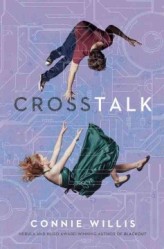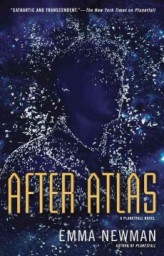One of the best things about speculative fiction is that it gives us a different perspective on our present lives, sometimes by taking a trend or development that already exists and extending or expanding it, sometimes by creating a different world which mirrors ours in some ways and differs in others. We have some fascinating new speculative fiction here at the Field, so come in and get a new look at our world.

Would it be a good thing to be totally connected to all the people you care about, 24/7? While it may seem, these days, that we’re already there, Connie Willis, in her latest book, Crosstalk, demonstrates that there still might be more connectivity available to us, and that it might not be a good thing. We may already have gone too far in our need to be connected to each other. In Willis’ world, there’s a simple outpatient procedure that couples can do that is supposed to give them greater empathy for each other, and of course it’s massively popular. Briddey Flannigan’s fiancee suggests they undergo this procedure, and she thinks it’s a great idea, except that it doesn’t quite work out the way it’s advertised. She discovers that she’s not sharing more emotions with her fiancee. Instead, she’s hearing the thoughts of someone else entirely, a tech nerd in her office, and she can’t seem to shut him out or get herself back on track. And that’s just the beginning of her problems. The world of Crosstalk isn’t so far removed from ours after all; just a slight change of technology and we, too, could be facing the problems, not of failure to communicate, but excess of communication. Or are we already facing that?

What if there were an anti-aging lotion that started to mess around with your DNA? What if, instead of making you look younger and more beautiful, it made you change into a different person? Would the company that developed such a product bring it to market even knowing that there were these very odd and not-as-advertised side effects? Of course it would, and thereby hangs a tale, specifically the plot of Extreme Makeover by Dan Wells. Not only does the company, New Yew, think it’s a beauty breakthrough, but there are other players who see this new lotion as a potential weapon, and the scientist who developed the lotion in the first place wants to destroy it entirely. It’s not every day that a health and beauty company has the power to destroy the world, but this may happen in Extreme Makeover. After all, it is called extreme, right?

The story of the starship leaving Earth to explore strange new worlds and new civilizations is an old trope in speculative fiction, and there are all kinds of ways authors ring changes on this situation, but Emma Newman, in After Atlas, takes a different tack. Instead of following the ship, Atlas, away from earth to find truth among the stars, she focuses on the people left behind on earth, and sees how they were affected by the ship’s departure. Specifically, the protagonist, Carlos Moreno, lost his mother when she left on the ship Atlas, and in a way lost his father to despair as well. When the ship left earth, the religious cult known as the Circle, led by Alejandro Casales, began to rise in power. Now, forty years after the departure of the Atlas, Casales has been found dead in his hotel room, and Carlos is the officer called upon to investigate his death. He’s supposed to keep his personal feelings from influencing his investigation, but that proves to be more difficult than he would have thought, and the question of who would kill Casales now leads him into all kinds of other questions, about Atlas, about why the ship left and what was really going on, what is still really going on here on earth.






























